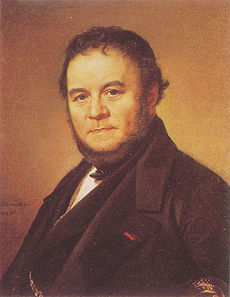Are there too many books in the world? No! Are there too many books for one person to read in a lifetime? Absolutely! The dilemma feels similar to Stendahl’s Syndrome, a temporary response of being physically and emotionally debilitated while in the presence of great works of art.
According to Wikipedia, “the illness is named after the famous 19th-century French author Stendhal (pseudonym of Henri-Marie Beyle), who described his experience with the phenomenon during his 1817 visit to Florence in his book Naples and Florence: A Journey from Milan to Reggio. Although there are many descriptions of people becoming dizzy and fainting while taking in Florentine art, especially at the Uffizi, dating from the early 19th century on, the syndrome was only named in 1979, when it was described by Italian psychiatrist Graziella Magherini, who observed and described more than 100 similar cases among tourists and visitors in Florence.”
Just thinking about all the books I will never be able to read no matter how long I live makes me feel light-headed and rather sick. So what to do?
Free sample chapters in electronic format offer a slight remedy, at least for me. I have quite a collection on my Kindle of first chapters of books by various authors, which gives me an idea of the writer’s voice and style, as well as the subject matter. Sometimes I am compelled to buy the book, sometimes I am not, but my book awareness has greatly expanded. I know a little about a lot more authors, I am able to better keep up with new books as well as classics, not to mention the ever expanding sea of mid-list titles.
Even with free sample downloads I still buy tons of books. I buy hardbacks, paperbacks — new and used — I buy many e-books because my Kindle is great for travel. I always buy books by my favorite authors, I like reading their entire oeuvre and as a writer myself, I like following how my favorite authors develop over the years. I read a lot of nonfiction: History and biography are great favorites, and I love a good literary novel. My favorite authors, living and dead, are those who have insight into the psychology of their characters and who are able to bring alive the setting. Character-driven fiction, whether historical or urban contemporary, is what I most enjoy. Frankly, I don’t care so much what happens in a novel; what concerns me is how it affects the character.
In order to manage my literary case of Stendahl’s syndrome I concentrate on my favorite literary authors and on emerging authors in my genre, historical fiction. And of course I cannot neglect all of the wonderful nonfiction and scholarly books that I rely on for my research. In fact, as most historical fiction authors would agree, you can get happily lost in the research and never write the novel! One way to stay focused and write what only you can is by staying in touch with other like-minded authors who are producing. For inspiration there’s nothing like talking with a creative, productive author. In my next blog I’ll chat with historical fiction author, Alaric Bond.
Stay tuned!
